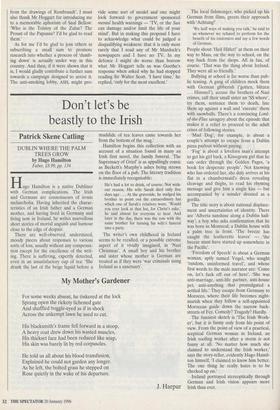Don't let's be beastly to the Irish
Patrick Skene Catling
DUBLIN WHERE THE PALM TREES GROW by Hugo Hamilton Faber, £8.99, pp. 134 Hugo Hamilton is a native Dubliner with German complications. The Irish and Germans are connoisseurs of ironic melancholia. Having inherited the charac teristics of an Irish father and a German mother, and having lived in Germany and living now in Ireland, he writes marvellous short stories of mortal anguish and humour close to the edge of despair.
There are well-observed, understated, moody pieces about responses to various sorts of loss, usually without any compensa- tion except for the excellence of the writ- ing. There is suffering, expertly detected, even in an unsatisfactory cup of tea: 'She drank the last of the beige liquid before a mudslide of tea leaves came towards her from the bottom of the mug.'
Hamilton begins this collection with an account of a situation found in many an Irish first novel, the family funeral. 'The Supremacy of Grief is as appallingly comic as Beckett's Murphy's ashes being strewn on the floor of a pub. The literary tradition is immediately recognisable:
He's had a lot to drink, of course. Not with- out reason. His wife Sarah died only five days ago .. . At the graveside, he nudged his brother to point out the extraordinary hat which one of Sarah's relatives wore. 'Would you ever look at that hat, for Christ's sake,' he said almost for everyone to hear. And later in the day, there was the row with the same brother for turning his wife's funeral into a party.
The writer's own childhood in Ireland seems to be recalled, or a possible extreme aspect of it vividly imagined, in 'Nazi Christmas'. A small boy and his brother and sister whose mother is German are treated as if they were 'war criminals using Ireland as a sanctuary'. The local fishmonger, who picked up his German from films, greets their approach with `Achtung!'
`We haff ways of making you talk,' he said to us whenever we refused to perform for the benefit of his customers and say a few words of German.
People shout 'Heil Hitler!' at them on their way to Mass, on the way to school, on the way back from the shops. All in fun, of course. 'That was the thing about Ireland. They were all so friendly.'
Bullying at school is far worse than pub- lic teasing. A gang of children mock them with German gibberish (`gotten, blitzen . . . Himmel'), accuse the brothers of Nazi crimes, call their small sister an 'SS whore', try them, sentence them to death, line them up against a wall and 'execute' them with snowballs. There's a convincing Lord- of-the-Flies savagery about the episode that makes it a relief to proceed to the adult crises of following stories.
`Mad Dog', for example, is about a couple's attempt to escape from a Dublin pizza parlour without paying.
`Fog' is about a lovelorn man's attempt to get his girl back, a Kissogram girl that he can order through the Golden Pages, 'a book for desperate people'. Not knowing who has ordered her, she duly arrives at his flat in a chambermaid's dress revealing cleavage and thighs, to read his rhyming message and give him a single kiss — but accompanied by a minder dressed as a gorilla.
The title story is about national displace- ment and uncertainties of identity. There are 'Alberta sunshine along a Dublin hall- way'; a boy who asks confirmation that he was born in Montreal; a Dublin house with a palm tree in front. 'The breeze has caught the leatherette leaves' — 'the breeze must have started up somewhere in the Pacific'.
`Freedom of Speech' is about a German woman, aptly named Vogel, who sought `random, uninformed travel', and whose first words to the male narrator are: 'Come on, let's fuck off out of here'. 'She was anti-marriage, anti-life partner, anti-house pet, anti-anything that promulgated a settled life.' They escape from Germany to Morocco, where their life becomes night- marish when they follow a self-appointed Moroccan guide down the narrow back- streets of Fez. Comedy? Tragedy? Hardly.
The funniest sketch is 'The Irish Work- er', but it is funny only from his point of view. From the point of view of a practical, sceptical German woman in Ireland, an Irish roofing worker after a storm is not funny at all. 'No matter how much she claimed to understand the Irish worker,' says the story-teller, evidently Hugo Hamil- ton himself, 'I claimed to know him better. The one thing he really hates is to be checked up on.'
Ireland portrayed stereoptically through German and Irish vision appears more Irish than ever.


























































 Previous page
Previous page